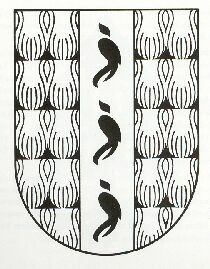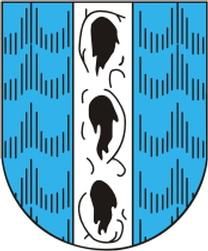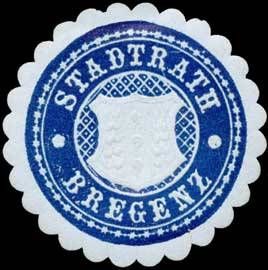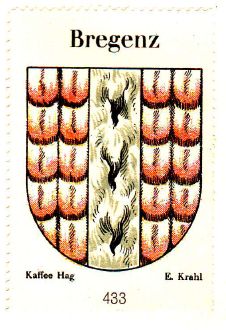Bregenz: Difference between revisions
Jump to navigation
Jump to search
Knorrepoes (talk | contribs) m (Text replace - "[[Literature" to "{{media}} [[Literature") |
Knorrepoes (talk | contribs) No edit summary |
||
| Line 14: | Line 14: | ||
====Origin/meaning==== | ====Origin/meaning==== | ||
The arms were officially granted on January 14, 1930, but were granted originally by Emperor Ferdinand I on February 24, 1529. | The arms were officially granted on January 14, 1930, but were granted originally by Emperor Ferdinand I on February 24, 1529. | ||
The arms have no described colours. Currently the city uses the arms mainly as blue, see image below. | |||
[[File:bregenz2.jpg|center]] | |||
The arms are based on the arms of the medieval Counts of Bregenz, who became extinct already in the 12<sup>th</sup> century. The choice of ermine indicated the importance of the counts at the time. | The arms are based on the arms of the medieval Counts of Bregenz, who became extinct already in the 12<sup>th</sup> century. The choice of ermine indicated the importance of the counts at the time. | ||
Revision as of 09:01, 25 August 2014
| Heraldry of the World Civic heraldry of Austria - Österreichische Gemeindewappen |
BREGENZ
State : Vorarlberg
District : Bregenz
Origin/meaning
The arms were officially granted on January 14, 1930, but were granted originally by Emperor Ferdinand I on February 24, 1529.
The arms have no described colours. Currently the city uses the arms mainly as blue, see image below.
The arms are based on the arms of the medieval Counts of Bregenz, who became extinct already in the 12th century. The choice of ermine indicated the importance of the counts at the time.
| The seal from around 1900 |
The arms in the Coffee Hag album +/- 1932 |
See also the use of the arms as the County Bregenz as used by the Austrian Emperor.
Contact and Support
Partners:
Your logo here ?
Contact us
© since 1995, Heraldry of the World, Ralf Hartemink 
Index of the site
Literature : Burmeister, 1975














